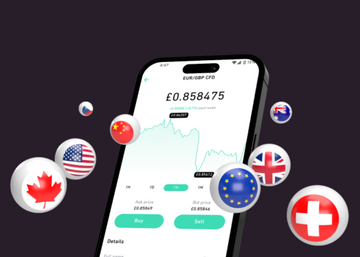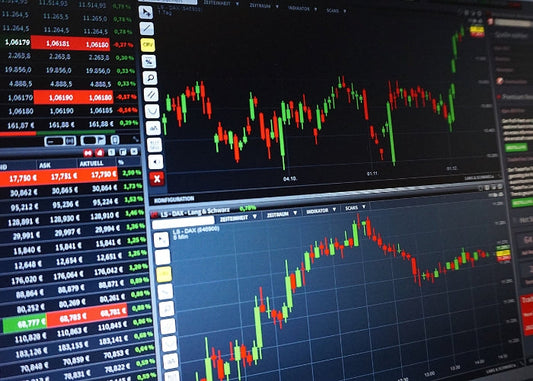How does Forex trading work?

The largest financial market in the world
Foreign exchange investments (Forex) can be suitable not only for professionals, but also for private investors. To do this, one should know how trading of this asset class basically works.
The Forex market is the largest financial market in the world, with a daily turnover of more than 6 trillion US dollars. This is hardly surprising. After all, it represents the global flow of goods. In addition, all international corporations trade currencies on a daily basis, for example to hedge against currency losses in their business transactions. For investors who invest in currencies, the extremely high liquidity of the market is a major advantage: the higher the volume traded, the better the supply, and the lower the spread, in other words the difference between the buying and selling rate a buyer has to pay when trading. The liquidity of the market also makes it easier to sell a currency. In the currency market you buy one currency and sell the other at the same time. For example, if you buy the Euro/Dollar an investor buys the Euro and sells the Dollar. So he is Euro „long“ and Dollar „short“.

Currencies are not tradable on the stock exchange
The special feature of forex markets is the way in which they are structured. There is no central place where prices are determined, as is the case with the stock exchange for shares or bonds. A currency transaction always takes place when two trading parties agree on the price of a currency. In this process, major banks predominantly act as providers by offering buying and selling rates. They provide the liquidity and thus make a market available as a so-called market maker. In this process, one currency is traded against another, therefore currencies are always traded ascurrency pairs on the foreign exchange market.
Add currencies to diversify your portfolio
But private investors also have the opportunity to participate in the market through specialized brokers. The brokers bring together the supply of the major banks with the demand of private customers. In doing so, the most favorable quotation of the connected liquidity providers is displayed in real time and the purchase or sale by the customer is executed immediately with the corresponding institutions. A side effect of the decentralized structure is round-the-clock availability. Foreign exchange is traded at most brokers 24 hours a day, five days a week.
Investors can diversify their portfolio with currencies. With currency investments, it is possible, for example, to compensate for losses of other assets such as stocks and bonds, or at least to limit losses of the portfolio. This is because currencies do not develop in synchrony with the classic asset classes. In addition, different currencies in the portfolio can also limit currency risks. For example, if an investor has mostly eurozone equities in his portfolio, he can hedge against losses in the value of the euro by buying another currency, such as the U.S. dollar. Another strategy is to bet on an economy with one currency. For example, if one assumes that the economy of a resource-rich country like Australia will boom in the future, one can invest in the Australian dollar, which usually rises with the high demand for the exported raw materials.
How to trade Forex as private investor
But how can private investors trade currencies? The easiest way would certainly be to deposit foreign exchange with the bank or a broker. Numerous banks and online brokers offer their clients special foreign currency accounts. They are usually available for all major currencies such as the US dollar, the British pound or the Japanese yen. Investors can deposit funds in such accounts in other currencies without any maturity restrictions and, if applicable, profit from exchange rate gains. However, this may incur fees that ultimately reduce returns.
Investors can also invest in currencies through specialized online brokers where they open an account. This is possible, for example, with Contracts for Difference (CFDs). The broker offers the platform and investors can pick a currency pair, for example, Euro/US dollar and trade it. If the investor believes that the euro will gain in value against the greenback in future, he invests capital in a long CFD on the currency pair. Foreign exchange is traditionally leveraged with CFDs. Investors are not required to have the full equivalent value of the traded position size when investing in currencies, but only have to deposit a security deposit (margin) with their broker. Thus, it is possible to move a multiple of the underlying currency pair with a relatively small investment and to achieve significantly higher profits.

However, the leverage works in both directions. If the market expectation of an investor is not fulfilled, correspondingly high losses will result. The leverage is usually limited to a maximum of 30 for standard currency pairs such as Euro/US Dollar or US Dollar/Japanese Yen. For all other currency pairs, the maximum leverage is 20. Forex trading via CFDs has gained in importance in recent years. Investors particularly appreciate the high liquidity of the market and the low transaction costs.
Trive offers an efficient trading platform and fast order execution for CFD trading with foreign exchange. Investors are not bound to trading hours. Except for weekends, they can trade around the clock at real-time rates. Investors who do not want to trade with real money immediately can open a paper trading account at Trive and try out forex trading with virtual money.
Forex trading has many features:
- The high liquidity on the foreign exchange market is an advantage for investors.
- Major banks are often active in the foreign exchange market and provide rates for numerous currency pairs.
- With foreign exchange, investors can stabilize their portfolio.
- Private investors can trade foreign exchange favorably with CFDs.
No comments
Home
Trive
TriveHub





0 comments